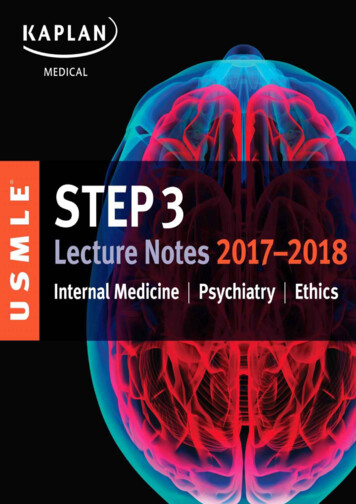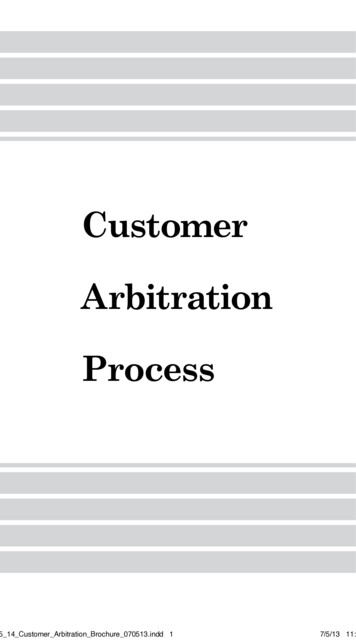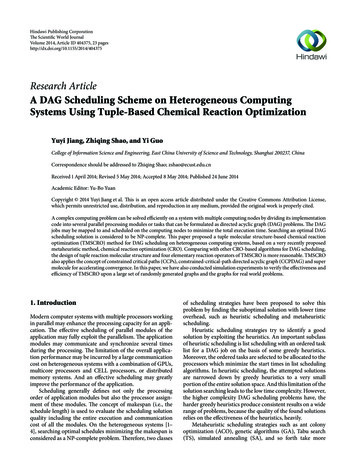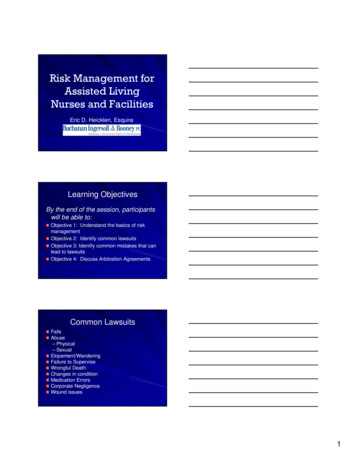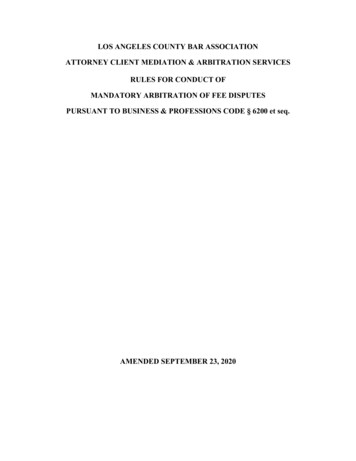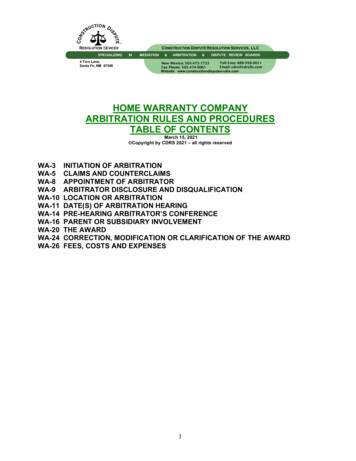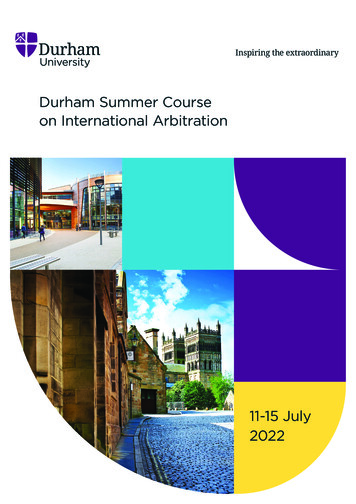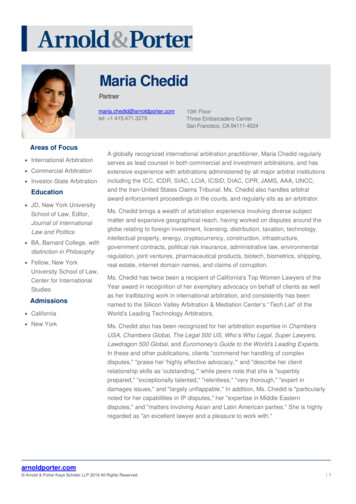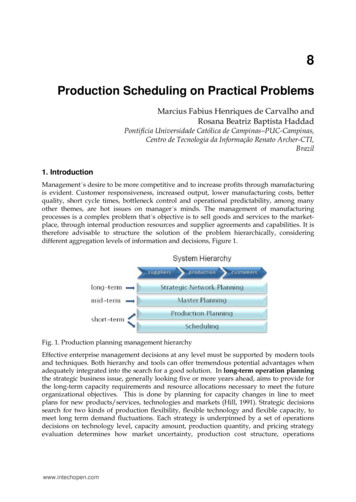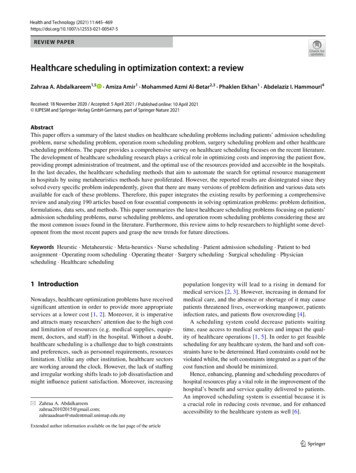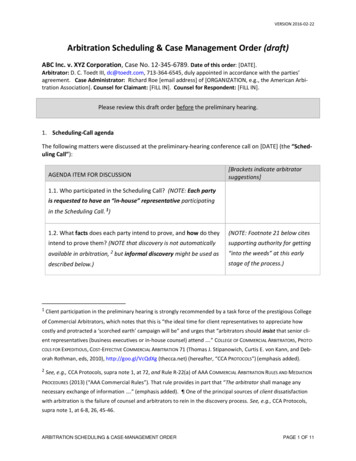
Transcription
VERSION 2016-02-22Arbitration Scheduling & Case Management Order (draft)ABC Inc. v. XYZ Corporation, Case No. 12-345-6789. Date of this order: [DATE].Arbitrator: D. C. Toedt III, dc@toedt.com, 713-364-6545, duly appointed in accordance with the parties’agreement. Case Administrator: Richard Roe [email address] of [ORGANIZATION, e.g., the American Arbitration Association]. Counsel for Claimant: [FILL IN]. Counsel for Respondent: [FILL IN].Please review this draft order before the preliminary hearing.1. Scheduling-Call agendaThe following matters were discussed at the preliminary-hearing conference call on [DATE] (the “Scheduling Call”):AGENDA ITEM FOR DISCUSSION[Brackets indicate arbitratorsuggestions]1.1. Who participated in the Scheduling Call? (NOTE: Each partyis requested to have an “in-house” representative participatingin the Scheduling Call. 1)1.2. What facts does each party intend to prove, and how do they(NOTE: Footnote 21 below citesintend to prove them? (NOTE that discovery is not automaticallysupporting authority for gettingavailable inarbitration, 2but informal discovery might be used asdescribed below.)“into the weeds” at this earlystage of the process.)1 Client participation in the preliminary hearing is strongly recommended by a task force of the prestigious Collegeof Commercial Arbitrators, which notes that this is “the ideal time for client representatives to appreciate howcostly and protracted a ‘scorched earth’ campaign will be” and urges that “arbitrators should insist that senior client representatives (business executives or in‐house counsel) attend .” COLLEGE OF COMMERCIAL ARBITRATORS, PROTOCOLS FOR EXPEDITIOUS, COST‐EFFECTIVE COMMERCIAL ARBITRATION 71 (Thomas J. Stipanowich,Curtis E. von Kann, and Deb-orah Rothman, eds, 2010), http://goo.gl/VcQdXg (thecca.net) (hereafter, “CCA PROTOCOLS”) (emphasis added).2 See, e.g., CCA Protocols, supra note 1, at 72, and Rule R-22(a) of AAA COMMERCIAL ARBITRATION RULES AND MEDIATIONPROCEDURES (2013) (“AAA Commercial Rules”). That rule provides in part that “The arbitrator shall manage anynecessary exchange of information .” (emphasis added). ¶ One of the principal sources of client dissatisfactionwith arbitration is the failure of counsel and arbitrators to rein in the discovery process. See, e.g., CCA Protocols,supra note 1, at 6-8, 26, 45-46.ARBITRATION SCHEDULING & CASE-MANAGEMENT ORDERPAGE 1 OF 11
VERSION 2016-02-22AGENDA ITEM FOR DISCUSSION[Brackets indicate arbitratorsuggestions]1.3. Is there any dispute about arbitrability, law, or rules?[No]1.4. Have any other necessary individuals or organizations notTo be discussedbeen joined and/or not appeared?1.5. Is this case mainly about disputed facts, or about disputedTo be discussedcontract interpretation or other legal-type issues?1.6. Should any specific issues be addressed early on motion?To be discussedHEARING SCHEDULE1.7. Hearing start date: 3 (NOTE: Dates in this draft order are de-[Tuesday, DATE] (“Week 12”)termined by working backwards from the hearing start date.)1.8. Hearing location:To be discussedDISCOVERY PLAN – DOCUMENTS1.9. Deadline(s) for mandatory initial exchange of documents ex-[Tuesday of Week 3], with updat-pected to be relied on at the hearing, per the arbitration rules: 4ing per paragraph 1.20 below.(NOTE: Preferably, documents produced will be page-numbered,with page numbering prefixed by (for example) the producingparty’s initials or by the first two or three letters of the party’sname, e.g., ABC-0001.)3 The AAA arbitration rules require the parties to “be cooperative in scheduling the earliest practicable date”forthe hearing. AAA Commercial Rule R-24. Setting an early date is also suggested in CCA PROTOCOLS, supra note 1,at 55.4 See AAA Commercial Rule R-22(b).ARBITRATION SCHEDULING & CASE-MANAGEMENT ORDERPAGE 2 OF 11
VERSION 2016-02-22AGENDA ITEM FOR DISCUSSION[Brackets indicate arbitratorsuggestions]1.10. What if any other documents are to be produced by agree-(NOTE: Please be preparedment or by direction of the arbitrator, and when?to discuss at the Scheduling Call.)1.11. Target date for finalizing agreements for production of re-[Tuesday of Week 8]quested (non-exchanged) documents:1.12. Agreed turnaround time for other agreed- or arbitrator-ap-[Five] business daysproved document requests: 5DISCOVERY PLAN – DEPOSITIONS & DEPOSITION SUBSTITUTES1.13. What individuals are currently thought likely to be most(NOTE: Please be preparedknowledgeable about particular disputed factual issues? 6to discuss at the Scheduling Call)1.14. Can informal telephone interviews be used for some wit-To be discussednesses (by agreement) in lieu of depositions? (See paragraph 5.)1.15. To what extent can written statements be used for directTo be discussedtestimony, with oral recap testimony and cross-examination? 7(This could obviate the need for some discovery depositions.)5 Counsel are encouraged to use the “Redfern Schedule” format for propounding and responding to document re-quests; see https://goo.gl/E2S0kJ at ICSID.WorldBank.org.6 Hat tip: This item was inspired byStephen J. O'Neil, Managing Depositions in Arbitration to Minimize Cost andMaximize Value, 69 DISP. RES. J. 14, 19 (2014).7 See AAA Commercial Rule R-35. Using writtenstatements for most direct testimony can save time for all con-cerned and reduce the need for depositions. This approach is increasingly used in federal-court bench trials and isvery common in international arbitrations.ARBITRATION SCHEDULING & CASE-MANAGEMENT ORDERPAGE 3 OF 11
VERSION 2016-02-22AGENDA ITEM FOR DISCUSSION[Brackets indicate arbitratorsuggestions]1.16. What if any depositions are currently thought to be cost-jus-To be discussedtifiable? (NOTE: Depositions are not automatically available in arbitration. 8 Given that each deposition generally costs each partythousands of dollars, I reserve the right to require that any agreement of of the parties’ counsel to take depositions be jointly approved by the parties themselves.)1.17. Might any 30(b)(6)-type discovery depositions be useful?To be discussed1.18. Can any depositions be scheduled for “sprint weeks”? 9[Weeks X and Y]OTHER ITEMS FOR DISCUSSION1.19. Do the parties wish me to enter a confidentiality order? If so,To be discussedshould it contain a “claw-back” agreement covering inadvertentproduction of privileged documents?1.20. On the following schedule, the parties should submit pro-[Mondays of Weeks 4, 8, and 11,posed revisions to the master exhibit list (see paragraph 3), andby 5:00 p.m. Central time]the Arbitrator’s Notebook, if any (see paragraph 11(b)):8 The AAA Commercial Rules do not provide for depositions except in large, complex cases— and even in suchcases, those rules tightly limit the availability of depositions: “In exceptional cases, at the discretion of the arbitrator, upon good cause shown and consistent with the expedited nature of arbitration, the arbitrator may orderdepositions to obtain the testimony of a person who may possess information determined by the arbitrator to berelevant and material to the outcome of the case. The arbitrator may allocate the cost of taking such a deposition.” AAA Commercial Rule L-3 (emphasis added).9 Hat tip: Scheduling depositions in “sprint weeks” is basedARBITRATION SCHEDULING & CASE-MANAGEMENT ORDERon a suggestion by Houston arbitrator David Waddell.PAGE 4 OF 11
VERSION 2016-02-22AGENDA ITEM FOR DISCUSSION[Brackets indicate arbitratorsuggestions]1.21. On the following schedule, additional case-management[Tuesdays of Weeks 4, 8, and 11,conference calls will be conducted to update and review theeach at 1:00 p.m. Central time]Arbitrator’s Notebook, if any (see paragraph 11(b)); to plan thenext steps; and to address any pending issues, especially whetherany additional facts can be stipulated:1.22. Mediation is scheduled as called for by AAA Commercial[Thursday of Week 9] atRule R-9 (possibly conducted as a mini-trial to the parties’ senior[LOCATION]management per AAA procedures if so agreed):1.23. Deadline for serving written expert reports (preferably joint[Tuesday of Week 10]reports if so agreed):1.24. Deadline for serving witness lists:[Wednesday of Week 11]1.25. Should we conduct separate hearing sessions for particularFor discussion, possibly in a fu-issues? (Some such sessions might be feasible by laptop-computerture conference callvideo conferences instead of in person.)1.26. Do the parties wish to agree to “baseball” arbitration for any[Yes – for all damagesparticular issues, to create an incentive for compromise? 10computations]POST-HEARING MATTERS1.27. Do the parties wish to agree that I will retain jurisdiction[Yes]for implementation of the remedy (if any) and/or remand (if any)?1.28. Do the parties wish to agree that either party can elect “ap-[No]pellate” arbitration before a three-arbitrator panel per AAA rules?10 The parties may wish to agree tothe procedure set forth at http://www.CommonDraft.org/#BaseballProtocol oralternatively to a “high-low” bracketing of damages.ARBITRATION SCHEDULING & CASE-MANAGEMENT ORDERPAGE 5 OF 11
VERSION 2016-02-22AGENDA ITEM FOR DISCUSSION[Brackets indicate arbitratorsuggestions]1.29. Do the parties wish to agree that the final award will be[No]temporarily non-binding to create a window for partial retrial incourt, with the challenging party normally bearing all expenses? 111.30. Do the parties wish to agree to expanded judicial-appealrights?[No]122. Rules of procedure and evidence:(a) We will conduct this arbitration in accordance with the parties’ agreement to arbitrate;the agreed arbitration rules; the applicable law; and this scheduling order.(b) To the extent consistent with the expedited nature of arbitration, we will also be generallyguided by familiar principles reflected in courtroom rules such as (for example) the FederalRules of Civil Procedure and the Federal Rules of Evidence.3. Agreed variations: The parties are free to vary any of the terms of this scheduling order by writtenagreement (any such agreement should be copied to me), except that if it appears to me that theagreement might delay the hearing or significantly increase the cost of the arbitration, then I mayin my discretion require that the parties themselves (as opposed to the parties’ outside counsel) approve the agreement in writing before I give effect to it. 1311 The parties may wish to agree to the procedure set forth athttp://www.CommonDraft.org/#ArbChallenge forpartial court retrial of the award with fee-shifting analogous to Fed. R. Civ. P. 68 and various state statutes.12 Expanded appeal rights by agreement might be available under state arbitration law but likely are not availableunder the Federal Arbitration Act. See generally 3 For a similarsuggestion, see CCA PROTOCOLS, supra note 1, at 52-53.ARBITRATION SCHEDULING & CASE-MANAGEMENT ORDERPAGE 6 OF 11
VERSION 2016-02-224. Discovery – running master list of exhibit-designated documents: To help keep overall costs down,beginning immediately, the parties are requested to work together (with the claimant “having thetypewriter”) to create and maintain a running list of documents designated for possible use as exhibits under AAA Commercial Rule R-22(b), in roughly the following format:MASTER EXHIBIT LIST, version [DATE TIME] [a]DOC. DATE [b]TITLE / DESCR.EXHIBITPRODUC-DESIGNATEDSTIPULATEDNO. [c]TION NOS.BY [d]AUTHEN.? [e] [f](a) To help avoid confusion, each version of the list that the claimant provides to the other party orparties should include a version date and time.(b) To the extent practicable, the list of documents should preferably be sorted into chronologicalorder.(c) Exhibit numbers normally should not be assigned until the exhibit list is finalized for the hearing,so that the exhibits, when arranged in order of exhibit number, will be roughly in chronologicalorder.(d) The exhibit list should identify all parties intending to rely on any particular document.(e) The parties are encouraged to stipulate to the authenticity of documents where possible.(f) All timely-produced exhibits will be received en masse at the start of the hearing, except for anythat are privileged or genuinely challenged as to authenticity. 14 The parties are reminded,though, that the more documents they introduce as exhibits, the costlier this arbitrationwill be, because I will necessarily spend — and bill for — more time in reviewing the exhibits.(g) The parties should discuss whether it would be feasible to keep the master exhibit list “in thecloud” (e.g., in a password-protected shared folder on Dropbox or Google Docs) for easy access.5. Discovery — option for conference-call interviews of opposing-party witnesses (when so agreed):(a) Each party (“defending party”) is encouraged to allow the opposing party to conduct reasonable, electronically-recorded, conference-call discovery interviews with individuals employed bythe defending party. (This can reduce the perceived need to formally depose the individual —but on the other hand, in some situations it might confirm the need for a deposition.)(b) Each individual who is questioned in such a discovery interview, in his or her sole discretion,on advice of counsel or otherwise, may decline to answer, during the interview, any particularquestion.14Adapted from the CCA PROTOCOLS, supra note 1, at 75 (fourth bullet point)ARBITRATION SCHEDULING & CASE-MANAGEMENT ORDERPAGE 7 OF 11
VERSION 2016-02-22(c) A party’s right, if any, to question a witness in a deposition or at the hearing will be neither limited nor expanded solely (i) by that party’s participation or non-participation in a discovery interview of that witness, nor (ii) by the witness’s refusal, during such an interview, to answer a particular question.6. Discovery — option for written questions in advance of depositions / interviews: To save time,each party conducting a discovery interview or an oral deposition is strongly encouraged to providethe witness, in advance, with neutrally-stated written questions, especially concerning subjects expected not to be in dispute such as (for example) questions about work history, dates, participantsin meetings, etc.(a) Whether or not to respond in writing to any particular written question is within the sole discretion of the witness, on advice of counsel or otherwise.(b) The parties are encouraged to agree to a procedure for accepting written answers to particularquestions, if any, in lieu of orally posing those questions to the witness.(c) A witness’s written answer to, or failure to answer, a particular written question will not in itselflimit or expand the questioner’s right, if any, to ask the same question again orally at a deposition or at the hearing.7. Discovery — third-party subpoenas: Any third-party discovery subpoena that a party wishes meto sign is to include a prominent citation of my legal authority to do so — assuming that I have suchauthority 15 — mainly to help educate the third party and its counsel.8. Motion practice is to be streamlined and fast-tracked:(a) To reduce costs and save time, the parties are strongly encouraged to check with me by email(copying the other side, of course) before submitting any motion.16 (NOTE: The arbitration rulesmight expressly require this for some motions, e.g., dispositive motions.) I do not mind having atleast some back-and-forth email “conversation” in lieu of traditional formal briefing, analogousto oral argument of motions made in open court.15 For a survey of case law concerning arbitrators’ authority to issue third-party discoverysubpoenas, see generallyLiz Kramer, Document subpoenas to third parties, at http://goo.gl/esq7C (ArbitrationNation.com 2012).16 By analogy: Under the 2015 amendments to the Federal Rules of Civil Procedure, Rule16(b)(3)(B)(v) now pro-vides that a scheduling order may “direct that before moving for an order relating to discovery, the movant mustrequest a conference with the court[.]” The committee notes state that “Many judges who hold such conferencesfind them an efficient way to resolve most discovery disputes without the delay and burdens attending a formalmotion, but the decision whether to require such conferences is left to the discretion of the judge in each case.”ARBITRATION SCHEDULING & CASE-MANAGEMENT ORDERPAGE 8 OF 11
VERSION 2016-02-22(b) To reduce expense, motions and responses should refer, where possible, to the relevant portions of the Arbitrator’s Notebook (see paragraph 11(b)), in preference to stand-alone briefing.(c) In motion practice, documents should preferably be referred to by production numbersand not by exhibit numbers (which under paragraph 4(c) will preferably not be assigneduntil the hearing).(d) I will often defer motions in limine about factual-type evidence until the hearing. My normalpractice is not to exclude such evidence in response to traditional objections (hearsay, foundation, etc.), but instead to consider how much weight to give to the evidence. This practice canhelp protect the award from subsequent challenges that the arbitrator engaged in “misconductin refusing to hear evidence pertinent and material to the controversy,” which is one of the fewgrounds for vacatur provided in the Federal Arbitration Act.17 Where evidence is disputed, counsel should “focus on the probativeness of the evidence, not its admissibility.”18(e) In the interest of reducing expense, the parties are encouraged to bring timely Daubert-typemotions about expert witnesses.9. Option for “hot-tubbing” of witnesses:(a) To save time and provide a better picture of the evidence, if two or more witnesses are expected to testify about the same general subject matter, then the parties should confer aboutwhether to have those witnesses testify, at least in part, in a conference-style format, so thatthey can identify and explain their points of agreement and disagreement. (NOTE: I have foundthis to be an effective way of streamlining witness testimony.)(b) For expert-witness testimony, I may in my discretion direct such a witness-conference format. 1910. Option to lead one’s own witness: To save time in oral direct examination, counsel may ask leadingquestions (within reason) to establish uncontroverted, evidentiary-type facts.2017 See 9 U.S.C. § 10(a)(3).18CCA PROTOCOLS, supra note 1, at 75 (first bullet point).19 See, e.g., Expert Witnesses in Arbitration20 Reminder: An argumentative8-9 (2012), http://goo.gl/Cw0R5q (Skadden.com)leading question is likely to diminish the weight given to the witness’s response;also, in some circumstances, a non-leading question might result in a more-persuasive response.ARBITRATION SCHEDULING & CASE-MANAGEMENT ORDERPAGE 9 OF 11
VERSION 2016-02-2211. Arbitrator questions & notebook: Throughout this arbitration, to help focus and manage the proceedings and reduce overall cost, I likely will do one or both of the following, in my discretion, subject to the parties’ right to overrule me by agreement as stated below:(a) I likely will pose questions to the parties from time to time about what specific facts they intendto prove (and why) and how they intend to prove them. 21 I will make such questions and answers available to all parties; that is to say, the questions and answers will not be ex parte.(b) I likely will provide the parties from time to time with a draft of a detailed, neutrally-stated“Arbitrator’s Notebook” that sets forth my then-current understanding of some or all of:(1) stipulations and disputed factual assertions concerning the parties’ claims and defenses;(2) the evidence made known to me by the parties;(3) the relevant law;(4) possibly, one or more questions about some or all of the above.(c) Some or all of the final text of the Arbitrator’s Notebook is likely to be incorporated into theaward; the parties therefore are encouraged to make timely written suggestions for revisions.(d) The cost of my preparing the Arbitrator’s Notebook should not be an issue, because in writingthe award, I will necessarily spend time organizing and drafting a statement of the evidence andthe law anyway; my doing some of that work as the case proceeds, and making it available tothe parties, will almost certainly be a net plus.(e) If the parties or their counsel agree that I should not ask questions (either in general or abouta particular subject) or that I should not make the Arbitrator’s Notebook available to them, thenI will of course abide by that agreement.21 See AAA Commercial Rule R-32(b), which provides that “The arbitrator, exercising his or her discretion,shallconduct the proceedings with a view to expediting the resolution of the dispute and may direct the partiesto focus their presentations on issues the decision of which could dispose of all or part of the case.” ¶ See alsothe arbitrator code of ethics of the American Arbitration Association, which contemplates that arbitrators will“engage in discourse with the parties or their counsel, draw out arguments or contentions [and] comment onthe law or evidence . These activities are integral parts of an arbitration.” Commentary, Canon I of the AAA'sCode of Ethics for Arbitrators in Commercial Disputes, available at https://goo.gl/kbAmoX (ADR.org). ¶ Similarly,a federal judicial manual recommends that at the initial pre-trial conference in complex cases, “the judge shouldrequire the attorneys to describe the material facts they intend to prove and how they intend to prove them,”FEDERAL JUDICIAL CENTER, MANUAL FOR COMPLEX LITIGATION § 11.33 at 44 (4th ed. 2004), and that judges “requir[e], withrespect to one or more issues, that the parties present a detailed statement of their contentions, with supportingfacts and evidence .” Id. at 46. (in the above quotations, all emphasis is mine — DCT.)ARBITRATION SCHEDULING & CASE-MANAGEMENT ORDERPAGE 10 OF 11
VERSION 2016-02-2212. Arbitrator’s option to circulate draft award: Unless the parties agree otherwise, I may in my discretion circulate one or more drafts of the award, to give the parties an opportunity to comment.2213. Reminder: No ex parte communications: All written communications to me by any party are to becontemporaneously copied to each other party; the parties and their counsel are not to communicate orally with me except at oral hearings and during case-management conference calls.14. Reminder: Confidentiality: The confidentiality provisions of the arbitration rules and/or of the parties’ agreement to arbitrate will govern unless otherwise agreed.15. Party agreement as to limitations of arbitrator’s role: By proceeding with this arbitration with meas the arbitrator, each party specifically acknowledges and agrees that:(a) I am not legal counsel for that party (or any other in this case); that party may not and will notrely on anything I say (orally or in writing) or do as a substitute for advice from a licensed attorney; and(b) my notes and files (not including any interim or final awards issued) are not a record in this caseand are not available to any party at any time without my express written consent, which I maygrant, withhold, or condition in my sole and unfettered discretion; I reserve the right to destroysome or all of my notes and files at any time.This scheduling order remains in effect unless and until modified or rescinded in writing.D. C. Toedt III, arbitratorDate signed22 Because arbitration awards can be appealed only on very-limited grounds, review of a draft award might bea party’s last post-hearing opportunity to change the outcome of the case. ¶ Review of a draft award by the partiescan also provide many of the benefits of a three-arbitrator panel without the attendant extra expense.ARBITRATION SCHEDULING & CASE-MANAGEMENT ORDERPAGE 11 OF 11
VERSION 2016-02-22 ARBITRATION SCHEDULING & CASE-MANAGEMENT ORDER PAGE 1 OF 11 Arbitration Scheduling & Case Management Order (draft) ABC Inc. v. XYZ Corporation, Case No. 12-345-6789.Date of this order: [DATE]. Arbitrator: D. C. Toedt III, dc@toedt.com, 713-364-6545, duly appointed in accordance with the parties agreement.
